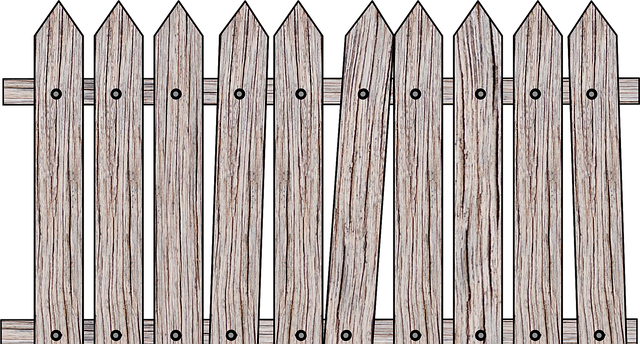New Bedford, MA residents often seek reliable and affordable fencing solutions to enhance their outdoor spaces. This article guides you through various aspects of choosing budget-friendly fences, from understanding local needs and regulations to exploring creative design options. We balance DIY installation tips with professional insights, ensuring long-term savings through proper maintenance practices.
- Understanding Fencing Needs in New Bedford
- Cost-Effective Materials for Modern Fences
- DIY vs. Professional Installation: A Balance
- Local Regulations and Permits: What You Need to Know
- Creative Designs on a Limited Budget
- Long-Term Savings: Maintenance Tips
Understanding Fencing Needs in New Bedford
New Bedford, MA residents have unique fencing needs shaped by the city’s coastal location and diverse neighborhoods. For some, privacy is paramount, especially in closer-knit communities where homes back up to each other. Others may seek security barriers to protect properties from potential coastal storms or high tides. Meanwhile, homeowners in historical districts might require fences that align with specific aesthetic guidelines preserving the area’s character.
Understanding these varying needs is crucial for offering tailored fencing solutions. Budget-friendly options can range from sturdy wooden fences providing both privacy and security to sleek metal barriers that offer visibility while deterring unauthorized access. Choosing the right type of fence not only meets practical requirements but also complements the surrounding environment, ensuring New Bedford residents get the best value for their investment.
Cost-Effective Materials for Modern Fences
In the quest for budget-friendly fencing solutions, New Bedford, MA residents have a variety of cost-effective materials to choose from that offer both functionality and modern aesthetics. Wooden fences, long a classic choice, remain popular due to their affordability and natural beauty. Treated lumber and composite materials are particularly durable options that resist rot and pests, ensuring your fence stands the test of time without breaking the bank.
For those seeking an even more economical alternative, vinyl fencing has gained significant traction in recent years. This low-maintenance option is highly versatile, available in a range of styles to suit any taste, from traditional picket fences to sleek, contemporary designs. Vinyl’s durability and resistance to fading and warping make it a wise investment for homeowners looking to enhance their outdoor spaces without overextending their budgets.
DIY vs. Professional Installation: A Balance
When considering fencing solutions for your New Bedford property, one of the primary decisions to make is whether to take on the project yourself (DIY) or hire a professional installer. DIY installation offers cost savings and gives homeowners a sense of accomplishment, but it requires time, skill, and access to the right tools and materials. On the other hand, professional installers provide expertise, ensure quality craftsmanship, and can complete the job more efficiently.
For budget-conscious residents, finding a balance is key. Consider factors like the type and complexity of the fence, your own DIY capabilities, and time constraints. Simple, straight-line fences might be feasible for ambitious do-it-yourselfers, while intricate designs or larger projects may be best left to professionals. Additionally, professional installers can often offer tailored advice based on local regulations and site conditions, ensuring a durable and compliant fence installation.
Local Regulations and Permits: What You Need to Know
New Bedford, MA residents looking to install fencing should be aware of local regulations and permit requirements. Before beginning any construction project, it’s crucial to check with the city or town clerk’s office to understand zoning laws and building codes that may apply to your property. These rules often dictate materials, heights, and placement restrictions for fences, among other structural elements.
Obtaining the necessary permits is a critical step in the process. Failure to do so could result in fines or even the requirement to remove any newly constructed fencing. Many municipalities offer online resources to help residents navigate these processes efficiently. It’s always a good idea to contact the relevant authorities early on to ensure your project complies with all requirements, saving you time and potential headaches down the line.
Creative Designs on a Limited Budget
New Bedford, MA residents looking for creative and budget-friendly fencing solutions need not look further than local artisans and DIY enthusiasts. With a bit of imagination and resourcefulness, it’s possible to transform your outdoor space into a beautiful and secure enclosure without breaking the bank. One innovative approach is to incorporate natural elements like reclaimed wood or locally sourced plants into the design. These materials can be used to build unique, rustic fences that blend seamlessly with the surrounding landscape.
Additionally, there are numerous cost-effective design options available, such as vertical gardens or living fences. Vertical gardens utilize space efficiently by growing plants up a trellis or fence, adding a touch of greenery and texture without taking up valuable ground area. Living fences, on the other hand, involve planting dense, fast-growing hedges to create a natural barrier. These creative solutions not only save money but also contribute to a more sustainable and aesthetically pleasing yard.
Long-Term Savings: Maintenance Tips
Fencing isn’t just about initial installation costs; it’s also crucial to consider long-term savings and maintenance. A well-installed fence can endure for decades with minimal upkeep, reducing replacement expenses down the line. For New Bedford residents, choosing a budget-friendly fencing solution doesn’t mean sacrificing quality or durability. Instead, it means selecting materials that require less frequent repairs and routine maintenance.
Regular cleaning, painting, or sealing of wooden fences is essential to prevent rot and pest damage. Metal fences often need occasional rust prevention treatments. Concrete fences may require resealing. Simple annual inspections can catch issues early on, ensuring minor fixes instead of major replacements. Proper trimming of nearby trees and shrubs also prevents them from damaging the fence during storms or strong winds, extending its lifespan even further.
